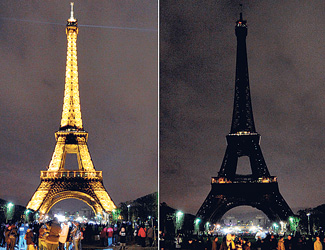SAO PAULO - As well-intentioned gestures go, Earth Hour is hard to beat. At the stroke of 8:30 p.m. on Saturday, March 27, nearly a billion people in more than 120 countries demonstrated their desire to do something about global warming by switching off their lights for an hour. In a show of official solidarity, the lights also went out at many of the planet's most iconic landmarks, from the Opera House in Sydney to the Great Pyramid at Giza, not to mention Beijing's Forbidden City, New York's Empire State Building, London's Big Ben, Paris's Eiffel Tower, and the skylines of both Hong Kong and Las Vegas.
What ever else it may be, Earth Hour is surely one of the most successful publicity stunts ever dreamed up. First organized in Sydney, Australia, in 2007 by the local chapter of the World Wildlife Fund, its popularity and the level of participation (both individual and official) that generates has exploded in recent years - to the point that there is barely a corner of the earth that the campaign hasn't touched. As Greg Bourne, CEO of World Wildlife Fund in Australia, put it: "We have everyone from Casablanca to the safari camps of Namibia and Tanzania taking part."
 |
| A combo shows the Eiffel tower submerging into darkness at 8:30 pm (local time) on March 27, 2010, in Paris as part of the Earth Hour switch-off, which comes just months after disappointing UN climate talks in Copenhagen. AFP |
But has Earth Hour actually done anything to halt - or even slow - global warming? Not so much.
The event's popularity is not hard to fathom. Who but the most die-hard global-warming denier could resist the notion, as Earth Hour's American website phrased it this year, that merely "by flipping off your lights on March 27 at 8:30 p.m. local time you will be making the switch to a cleaner, more secure nation"?
Needless to say, this was not quite the case. The main thing that anyone accomplished by turning off the lights at nighttime for an hour was to make it harder to see. The environmental impact was negligible. Indeed, even if everyone in the world had participated the requisite hour, the result would have been the equivalent of turning off China's carbon emissions for roughly 45 seconds.
Of course, this wildly optimistic calculation assumes that nobody used more power afterwards. Recent research by two Canadian psychologists found that people who spent money on green products were, immediately afterwards, less likely to be generous and more likely to steal than those who bought non-green stuff. Apparently doing something virtuous - like turning off the lights- makes us feel entitled to act badly afterwards.
The Earth Hour organizers acknowledged the symbolic nature of the exercise. Turning off the lights is just a "call to action," they noted. As WWF Director-General James Leape explained, it provides "a global platform for millions of people to voice their concern about the devastating effects of climate change." Added another WWF official, "It's saying to our politicians, you can't give up on climate change."
All well and good. But according to Andy Ridley, Earth Hour actually has a more specific agenda than that. In addition to being the guy who first came up with the idea for the event over drinks with friends in a Sydney pub several years ago, Ridley is also the executive director of Earth Hour Global, so he presumably speaks with some authority on the subject. "What we're still looking for in this coming year," he told the Associated Press last week, "is a global deal that encourages all countries to lower their emissions."
Therein lies the big problem with Earth Hour. As much as we would like to believe otherwise, the fact is that carbon emissions won't be lowered by a deal. If that were politically possible, it would have been done a long time ago - if not at the 1992 "Earth Summit" in Rio de Janeiro, then in Kyoto 12 years later; and if not in Kyoto, then in Copenhagen last December. But it wasn't.
Indeed, after nearly two decades of trying, the best climate deal that countries have been able to agree on is one that imposes no real obligations, sets no binding emissions targets, and requires no specific actions by anyone. Surely, there is a lesson here.
Alas, the organizers of Earth Hour prefer to ignore this inconvenient reality. But there is no getting around it. If we are serious about wanting to solve global warming, we need to take action that actually does good - as opposed to wasting valuable resources on empty agreements and moral posturing that merely make us feel good. Switching off our lights and promising to cut carbon emissions may make us feel momentarily virtuous, but that's all it does.
A meaningful solution to global warming needs to focus on clean-energy research and development, instead of fixating on empty promises of reductions in carbon emissions. For just 0.2% of global GDP, or $100 billion a year, we could bring about the game-changing technological breakthroughs that will be required to make green energy cheap enough to fuel a carbon-free future. So let's stop stumbling around in the dark and do something meaningful for a brighter future.
Bjørn Lomborg is the director of the think tank the Copenhagen Consensus Centre at Copenhagen Business School and the author of Cool It: the Skeptical Environmentalist's Guide to Global Warming.
Copyright: Project Syndicate, 2010. Exclusive to the Sunday Times |


